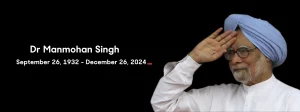(November 11, 2025) According to his friend, Lord Rami Ranger, Gopichand Hinduja was very fond of ‘desi’ music, so much so that every Sunday, he would invite his close circle of Indian friends in the UK to join him via Zoom. Once everyone logged in, the enthusiastic billionaire would kick off the ‘Antakshari’ or musical evening by singing some of his favourite Hindi songs. Once GP, as he was fondly known, set the mood, his close friends including Lord Rami Ranger, one of the UK’s leading British-Indian businessmen and a Conservative politician would join in chorus with him before singing their own favourites.
The desi songs, followed by chit-chat about the good old days, not only brought immense joy to GP and his close pals but also made their Sundays special, filled with the flavours of India. “I would always look forward to the musical event every Sunday, especially as Gopi ji would be in his elements. He was a good singer and always had an appropriate song for any occasion,” recalls Lord Rami Ranger, in an exclusive chat with Global Indian.
The head of Britain’s richest family, Gopichand P. Hinduja, fondly known as ‘GP’ in business circles, died aged 85 in London last week after a long illness. His passing has left a great vacuum in the lives of those who knew him closely, says Lord Ranger, talking about the death of the British-Indian industrialist. “His passing marks the end of an era, as he was truly a well-wisher of the community and a guiding force,” he adds.

Humility and humanity
Recalling his close association with GP, Lord Ranger says he was a humble and down-to-earth person despite being a billionaire. “He was the wealthiest man in the United Kingdom, yet his humility was his greatest achievement,” he says of the Chairman of the Hinduja Group and Hinduja Automotive Ltd, UK. GP, he says, had a tremendous sense of humour and was always willing to support good causes. “His heart was always in the community. He would never be aloof like many of the rich who seek fame and fortune but have no time for the community or the country. But Gopi was the opposite,” says Lord Ranger.
The Hinduja legacy
Gopichand Hinduja and his family made their fortune from the Indian conglomerate Hinduja Group, which operates in 11 sectors including finance, media and entertainment, and oil. The Hinduja conglomerate functions in 48 countries and employs about 200,000 people. The Hinduja family topped the most recent Sunday Times Rich List with a net worth of £35.3 billion. They also ranked 11th on the Forbes list of India’s 100 richest businesspeople in 2024. Gopichand was the second eldest of four brothers who controlled the business for decades.
A god-fearing family man
“He was someone who could make everyone feel special. He never distinguished between rich or poor; for him, everybody was the same,” says Lord Ranger. Describing him as a truly remarkable human being, Lord Ranger adds that Gopichand was god-fearing, family-oriented, and deeply community-minded.
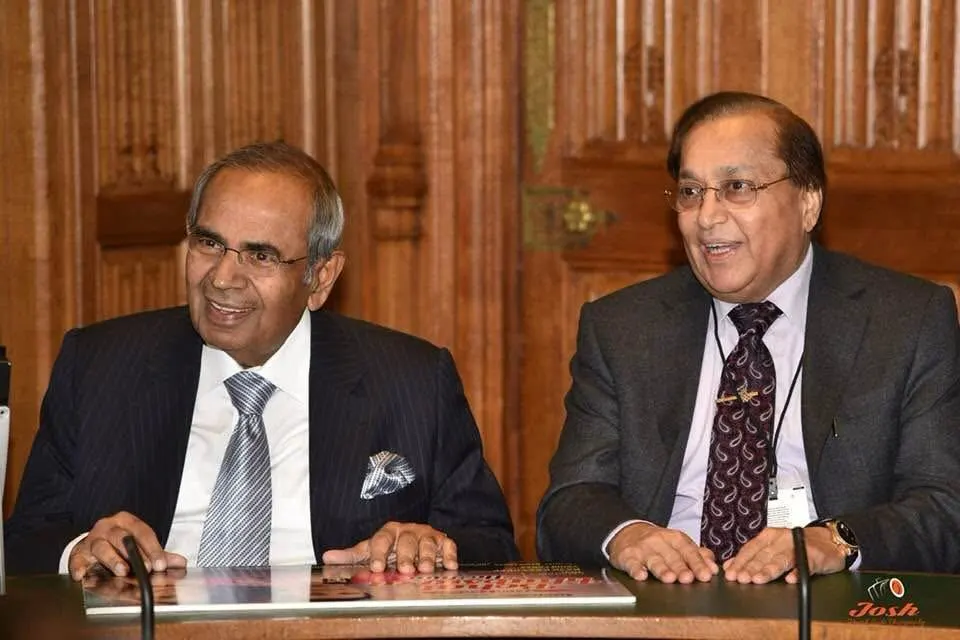
Gopichand Hinduja and Lord Rami Ranger
The Hinduja dynasty
Born in 1940 in Sindh in undivided India, Gopichand took over the group co-chairmanship in May 2023, following the death of his brother, Srichand. He belonged to the second generation of the Hinduja family. The enterprise was originally set up as a trading company by his father, Parmanand Deepchand Hinduja, in 1919, following his relocation from Sindh (now in Pakistan) to Iran. The headquarters later moved to London in 1979.
Education and early years
He graduated from Bombay’s Jai Hind College in 1959, and held an Honorary Doctorate of Law from the University of Westminster and an Honorary Doctorate of Economics from Richmond College, London. He joined the family business in Mumbai in 1959 and helped transform his father’s modest textile and trading ventures into a global conglomerate — one of India’s largest companies. Gopichand was one of the architects of the Group’s transformation from an Indo–Middle East trading operation into a multi-billion-dollar transnational conglomerate.
A visionary business mind
Gopichand’s business philosophy was best summarized by one phrase — common sense. A major turning point came when the Group acquired Gulf Oil in 1984, followed by the acquisition of the struggling Indian automotive manufacturer Ashok Leyland in 1987, the first major NRI investment in India at the time. Today, it is regarded as one of the most successful turnaround stories in Indian corporate history. He was also the visionary behind the Group’s forays into the power and infrastructure sectors, spearheading efforts to build multi-GW energy generation capacity in India.
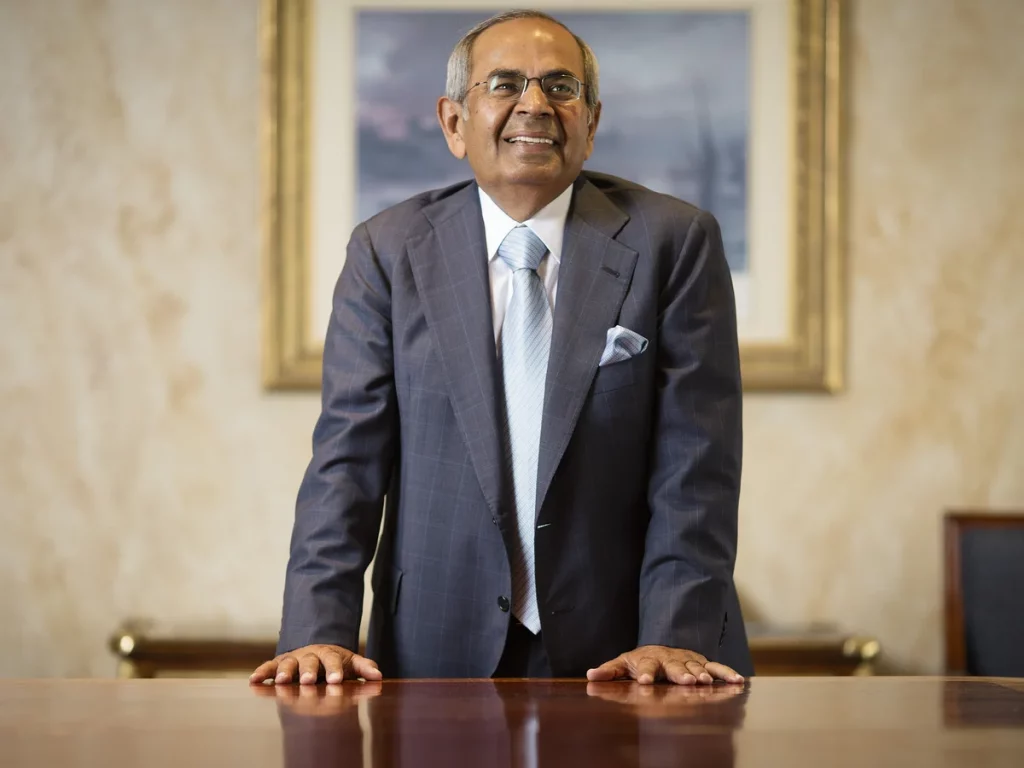
Rooted in values
Another close friend of Gopichand, Lakshmi Mittal, Executive Chairman of ArcelorMittal mentioned in a personal tribute that through all of Gopichand’s achievements, and the controversies that occasionally surfaced, he remained remarkably rooted, never losing sight of the values and faith that underpinned his success. “Short in height but tall in stature, he immediately put people at ease and had a character that could find fun even in serious matters,” said Mittal in his personal tribute to the late British-Indian industrialist.
Warm and welcoming
“When my family moved to London 30 years ago, Gopi was among the first to welcome us with warmth and affection. Over the years, our relationship blossomed. I always cherish the time we spent together and the lessons he shared about friendship, faith, and perseverance,” says Mittal. He adds that Gopichand was incredibly loyal and always showed up to support his friends. “His love for life made him a wonderful guest at any event, and he was generous with his time and spirit to everyone.”
Bridging India and the UK
“In my view, what also made Gopi a man above others was his belief that business carried a broader purpose, creating opportunity and bridging cultures,” says Mittal, highlighting that he was an important force in strengthening the bond between India and the United Kingdom, ultimately reflected in Prime Minister Narendra Modi’s achievement of a free-trade agreement between the two countries this year. Mittal describes the late industrialist as a champion of enterprise whose vision created an Indian global conglomerate long before others emerged in the wake of a resurgent Indian economy. “He was genuinely proud to contribute to the Indian growth story.”
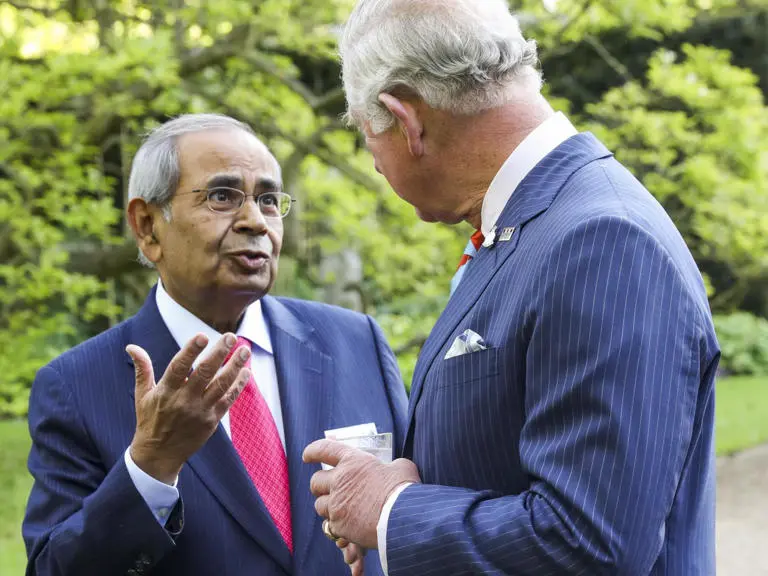
Gopichand Hinduja with King Charles III
Impact on the British-Indian community
Mittal believes his impact on the British community was insufficiently acknowledged by traditional elites.“Gopi’s happy companionship with London’s small traders amounted to a telling endorsement. He did not have to attend yet another community function in the suburbs. And so, his presence here and there in London helped shape the story of British Indians.”
He helped define what it meant to succeed as an Indian in the UK during a time when India was emerging as a magnet for investment following its groundbreaking economic reforms in the 1990s. “His impact on London is visible in many ways, too, notably in the projects that have helped redraw its landscape. The redevelopment of the Old War Office into The OWO hotel stands as a testament to his vision, and an ability to blend history, elegance, and modernity in ways that enrich the city’s fabric,” says Mittal. In Gopi’s own words, “The OWO will be my greatest legacy to London for future generations to enjoy.”
Whether in the company of a head of state or a young entrepreneur, Gopichand listened with patience and spoke with the conviction that comes from a lifetime of experience. “I have benefited from this for many years. Gopi will be remembered as a titan of business and a true gentleman,” adds Mittal.
Champion of India–UK relations
Lord Karan Bilimoria, founder of Cobra Beer, said GP would be remembered as someone who “personified” the links between India and the UK. “Whether it was in banking, manufacturing, or property, they were always putting the UK and India together,” he says, adding that GP was not only a famous and respected individual in both countries but also a great champion for India–UK relations. “We shall miss him greatly.”
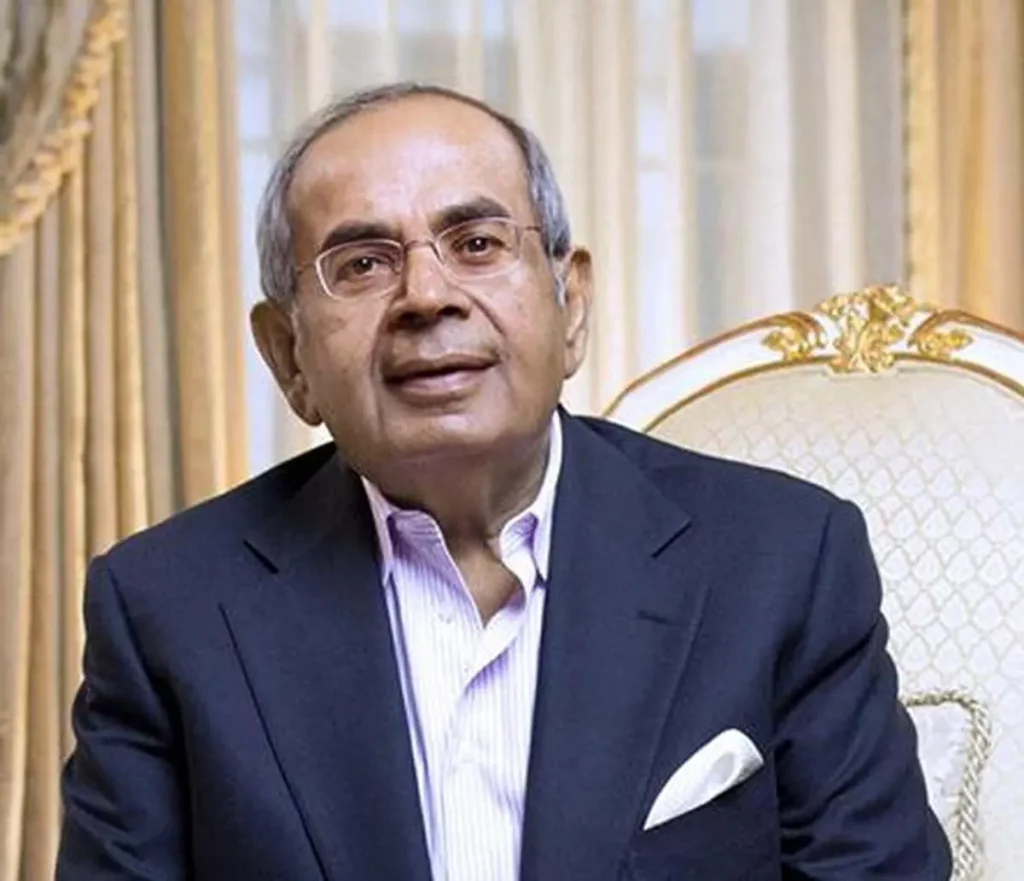
Shadows of controversy
The Hinduja family found itself entangled in a series of controversies, beginning with the alleged role of the three brothers — Srichand, Gopichand, and Prakash in the Bofors scandal. In 1987, Swedish newspaper Dagens Nyheter, quoting highly placed company sources, alleged that the Hindujas were recipients of commissions paid by Bofors in connection with winning the Bofors–India Howitzer contract of March 24, 1986.
However, the case against them was dismissed by the Delhi High Court in 2005 due to lack of evidence. The group also became embroiled in the ‘cash-for-passports’ controversy in England, a Swiss court case for alleged exploitation of domestic workers, and more recently, an internal family succession dispute that turned into a legal battle.
However, Gopichand Hinduja’s contributions far outweighed the controversies that occasionally surrounded him. A visionary leader and a pillar of the Hinduja Group, he is fondly remembered and deeply missed by his close associates and well-wishers.
ALSO READ: Remembering Ratan Tata: The visionary who built communities and transformed Indian industry


